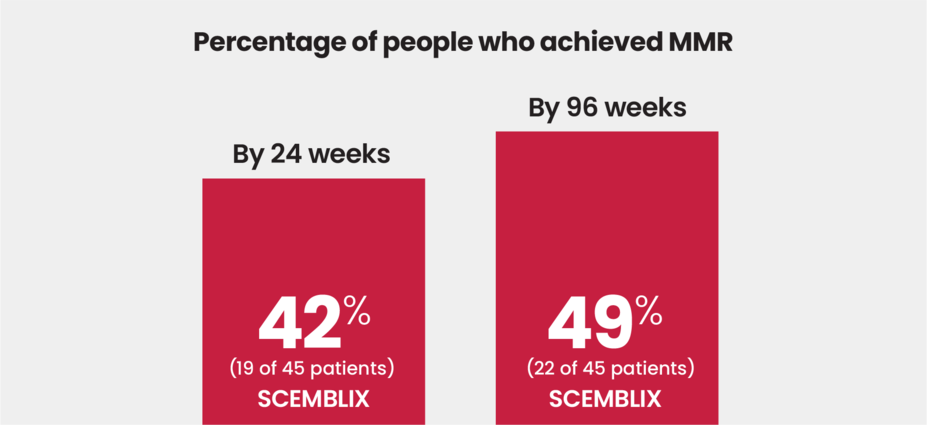
If you have Ph+ CML in chronic phase with the T315I gene mutation, SCEMBLIX may be
a good fit
Your doctor may have you tested for a gene mutation called T315I if your medication:
stopped responding
couldn't help you reach certain treatment milestones
What is the T315I gene mutation?
It is a gene mutation that can develop in Ph+ CML cancer cells. This mutation can change how cancer cells respond to TKI medications, and may result in drug resistance. If that happens, ask your health care team if SCEMBLIX may be a treatment option for you. |
More than 40% of patients with the T315I gene mutation achieved MMR with SCEMBLIX by 24 weeks
Major molecular response (MMR) is a treatment goal that is reached when the level of BCR::ABL1 gene in the blood is ≤0.1% of the level measured at your CML diagnosis.
Common side effects
In this clinical trial, the most common side effects reported (≥ 20%) were pain in muscles, bones, or joints; tiredness; nausea; rash; and diarrhea.
These are not all of the possible side effects of SCEMBLIX.
Review the serious and most common side effects of SCEMBLIX. Learn more
Ask your health care team about SCEMBLIX
If your current treatment isn’t working as you hoped, ask your health care team if you should be tested for the gene mutation. Here’s a guide to help you get the conversation started about testing and if SCEMBLIX could be a good fit for you.
|
Take SCEMBLIX exactly as prescribed
It’s important to follow your doctor’s treatment plan. For more information on how to take SCEMBLIX, learn more here.
Ph+ CML-CP, Philadelphia chromosome-positive chronic myeloid leukemia in chronic phase.
*Limitations apply. Valid only for those with private insurance. The Program includes the Co-Pay Plus offer, Plus Card (if applicable), and Rebate, with a combined annual limit. Patient is responsible for any costs once limit is reached in a calendar year. Program not valid (i) under Medicare, Medicaid, TRICARE, VA, DoD, or any other federal or state healthcare program, (ii) where patient is not using insurance coverage at all, (iii) where the patient’s insurance plan reimburses for the entire cost of the drug, or (iv) where product is not covered by patient’s insurance. The value of this program is exclusively for the benefit of patients and is intended to be credited towards patient out-of-pocket obligations and maximums, including applicable co-payments, coinsurance, and deductibles. Program is not valid where prohibited by law. Patient may not seek reimbursement for the value received from this program from other parties, including any health insurance program or plan, flexible spending account, or healthcare savings account. Patient is responsible for complying with any applicable limitations and requirements of their health plan related to the use of the Program. Valid only in the United States and Puerto Rico. This Program is not health insurance. Program may not be combined with any third-party rebate, coupon, or offer. Proof of purchase may be required. Novartis reserves the right to rescind, revoke, or amend the Program and discontinue support at any time without notice.

